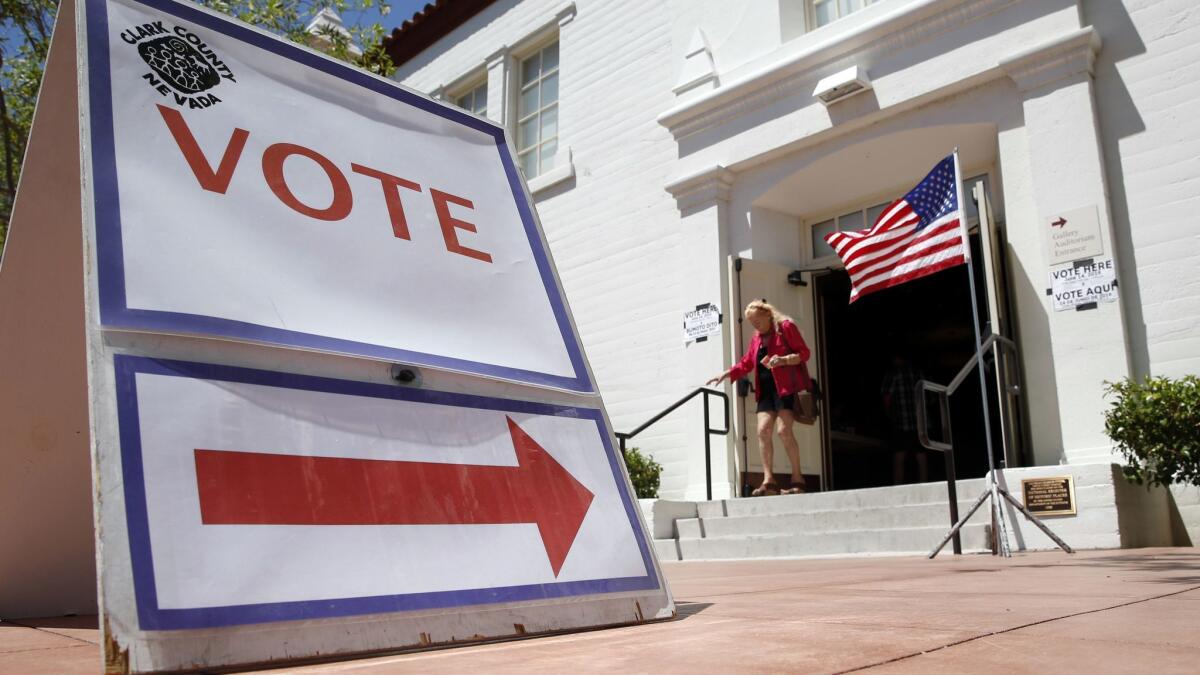Op-Ed: Don’t worry, all is not lost. State and local activists are fixing our elections

Despair appears to be the common mood of the day. Everything is terrible. U.S. democratic norms have devolved so much that it seems impossible to know how to recover. Our political outcomes don’t consistently reflect our true aspirations. Yes, the whole system feels rigged — against the majority of Americans.
Why not just throw up our hands?
The answer is that this moment also presents a powerful opportunity to create a better, more robust democracy. That starts, of course, with registering to vote and going to the polls on Nov. 6. We also need to change the very structure of our electoral system — and on that front there are several positive movements to reform state and local laws that are worth celebrating.
Inspiring individuals are showing us the way. Take the example of Katie Fahey, who started a movement to reform redistricting in Michigan. She posted a simple message on Facebook after the 2016 election: “I’d like to take on gerrymandering in Michigan, if you’re interested in doing this as well, please let me know.” That single post generated further discussion, thousands of volunteers who gathered signatures, and now Proposal 2, a state ballot measure to create an independent redistricting commission. Next month Michigan voters will decide whether to take back the power to determine district boundaries from entrenched politicians who mostly drew the lines to help themselves or their party in future elections.
Desmond Meade of Florida, a former-convict-turned-law-school-graduate, is another democracy champion. He is advocating to reform the state’s felon disenfranchisement law, which is one of the worst in the country. Florida disenfranchises felons for life, taking away the right to vote — our most fundamental aspect of citizenship — from more than 1.4 million Floridians, with a disproportionate number coming from minority communities. This November, Florida voters have a chance to change that law and reinstate the right to vote to all but those convicted of murder or a felony sexual offense after they complete their sentence, parole and probation. The state constitutional amendment requires 60% approval to pass and early polls look encouraging about its chances.
Fahey, Meade, Smith and other democracy champions all over the country show us that change is possible.
Alison Smith, a stay-at-home mom, became interested in campaign finance reform and helped to usher in public financing for elections in Maine. Although there is still partisan bickering over Maine’s Clean Election system, politicians on both sides have used it to fund campaigns, easing the stranglehold of wealthy interests in the state’s elections. As Smith told me when I interviewed her: “It’s a very hopeful, open door for democracy. We can help our friends and colleagues run for office instead of having people self-select because they have enough money or have wealthy friends.”
Voting has also become more convenient in places such as Colorado, with its vote center model, which allows a person to vote anywhere in the county, not just at their home-based precinct. (California is in the process of rolling out vote centers, starting in five counties this year.) Vote-by-mail, also known as vote at home, increases turnout as well, and it’s used for all ballots in Washington, Oregon and Colorado. Colorado has the best system, combining vote-by-mail for those who want to fill out their ballots early with vote centers for voting on election day, with little evidence of fraud. Automatic voter registration, despite the mistakes made this year by the California Department of Motor Vehicles, is working efficiently in over a dozen states. States with these reforms exhibit some of the highest voter turnout.
Enter the Fray: First takes on the news of the minute from L.A. Times Opinion »
There have also been many local wins, such as the adoption of ranked choice voting. This alternative voting method lets voters rank candidates in order of preference, leading to a better sense of the electorate’s overall desires, no need for runoff elections, and less negative campaigning. It’s now the norm in several cities across the country and in some statewide elections in Maine. Some localities have lowered the voting age for local or school board elections to 16 to engage the next generation of citizens earlier; voters in Golden, Colo., will decide this November whether to make this change for their own elections.
Would these reforms have altered the outcomes of previous elections and the current trajectory of our democracy? It’s impossible to know and useless to speculate. Instead, we should focus on strengthening our democratic institutions going forward. Fahey, Meade, Smith and other democracy champions all over the country show us that change is possible. Positive solutions can work to improve turnout and democratic engagement. There’s so much we can do to create that more perfect union.
Joshua A. Douglas is a professor at the University of Kentucky College of Law and author of “Vote for US: How to Take Back Our Elections and Change the Future of Voting.”
Follow the Opinion section on Twitter @latimesopinionand Facebook.
More to Read
A cure for the common opinion
Get thought-provoking perspectives with our weekly newsletter.
You may occasionally receive promotional content from the Los Angeles Times.










